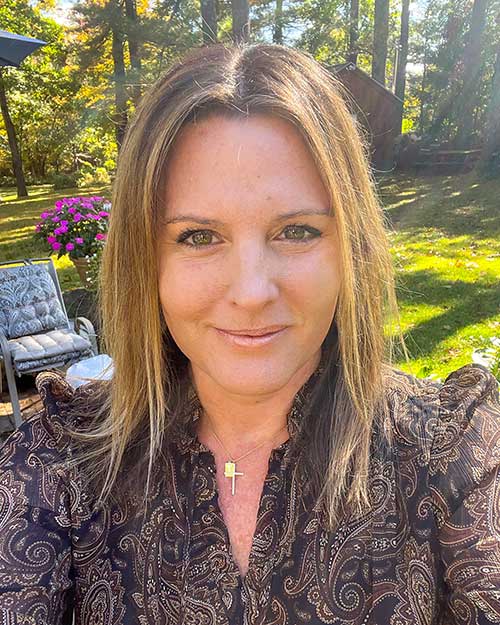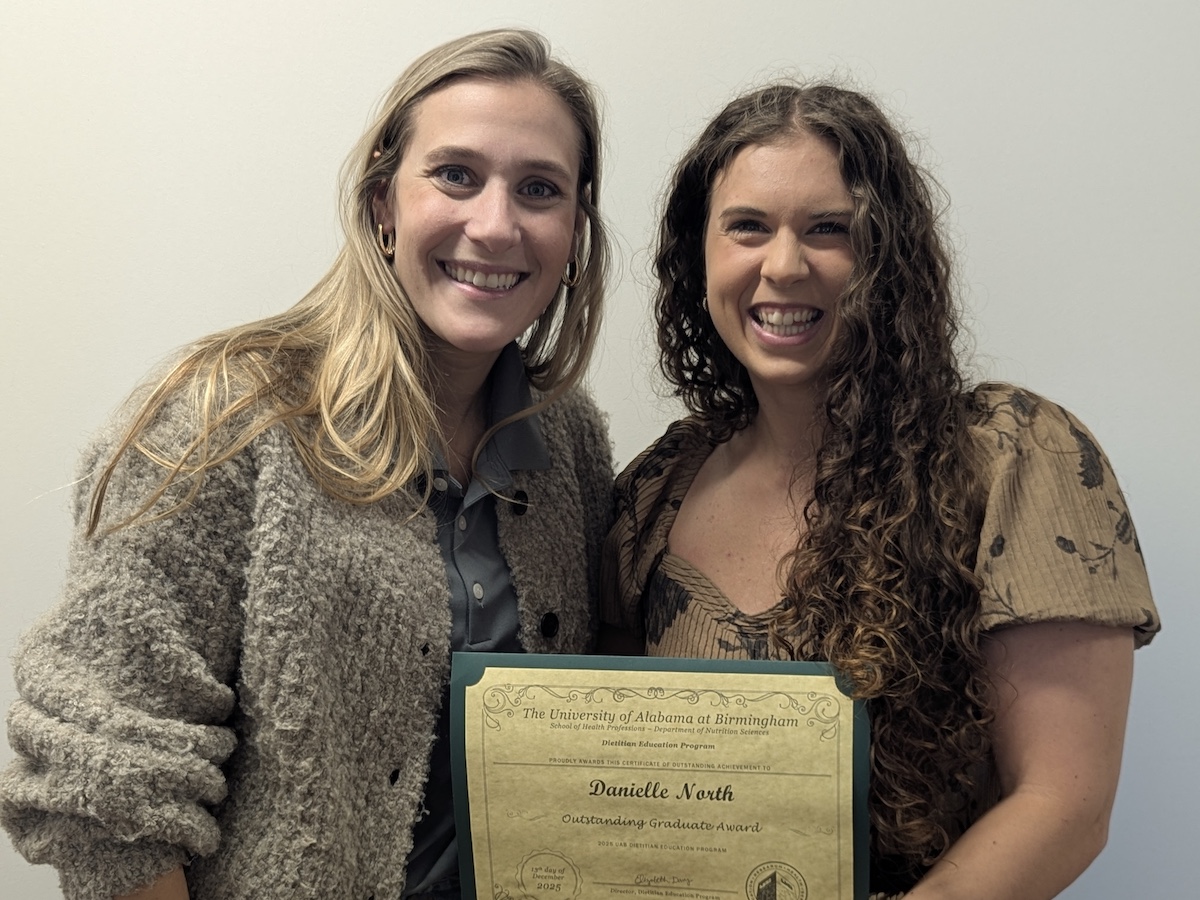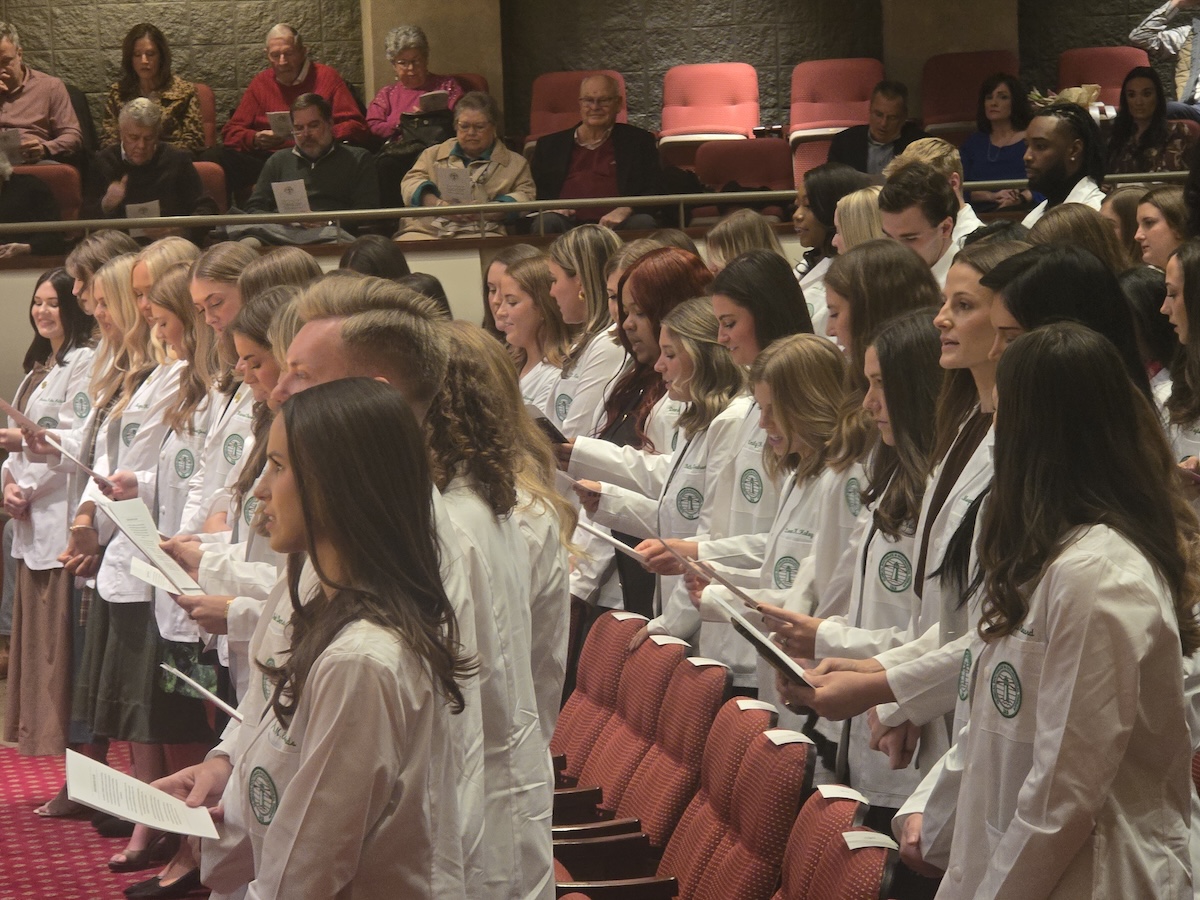 Sarah Tucker, PhD, OTR/LAssistant Professor of Occupational Therapy Sarah Tucker, PhD, OTR/L, was honored with the 2025 Odessa Woolfolk Community Service Award at a ceremony on October 22 at the UAB Alumni House. Provost Janet Woodruff-Borden, PhD, noted that the award commemorates its namesake, an educator and civic leader whose lifelong commitment to justice and education is reflected in Tucker’s work in the classroom and the community (read more about Woolfolk below).
Sarah Tucker, PhD, OTR/LAssistant Professor of Occupational Therapy Sarah Tucker, PhD, OTR/L, was honored with the 2025 Odessa Woolfolk Community Service Award at a ceremony on October 22 at the UAB Alumni House. Provost Janet Woodruff-Borden, PhD, noted that the award commemorates its namesake, an educator and civic leader whose lifelong commitment to justice and education is reflected in Tucker’s work in the classroom and the community (read more about Woolfolk below).
Nominees, Woodruff-Borden said, are evaluated on their involvement with students, positive contributions to society, length of community service, and demonstrated humanitarianism.
Tucker’s teaching, research, clinical work, and service have improved lives and restored hope and dignity for society’s most vulnerable and marginalized people. Her work has touched the lives of foster children and other at-risk youth, individuals who are incarcerated, and people who have returned to the community after prison release.
Her current service involvement includes her work with the Jefferson County Second Chance Hiring Fair, where she volunteers her time to help organize and execute a biannual career fair for individuals seeking employment after criminal legal system involvement. She is a volunteer consultant and board member of Redemption Earned, where she helps to promote successful reentry for the elderly and seriously ill who are eligible for medical parole or furlough (read more about Tucker’s work with Redemption Earned). She is an advocate for expanding the role of occupational therapy, including exploring interdisciplinary partnerships to provide palliative care programming and trauma-informed training for people who are impacted by the cycle of incarceration.
She has a long history of community service, including current or past involvement with a variety of organizations such as Firehouse Shelter, Kairos Outside, Shepherd’s Fold Alabama, and the Offender Alumni Association, organizations that support men, women and families affected by the justice system and individuals navigating life after incarceration.
Educator and Mentor
Tucker is director of the Post-Professional Clinical Doctorate in Occupational Therapy program and an instructor for entry-level OTD students. As an educator, she encourages students to view occupational therapy as a platform for equity and change. Her long-standing practice of connecting students with opportunities to learn from and support community partners has helped make a commitment to service a hallmark of the department’s programs, said Department of Occupational Therapy Chair Gavin Jenkins, PhD, OTR/L.
She also brings this call to action to the wider UAB community. Tucker founded the Student Advocacy and Restorative Justice Club for UAB undergraduate and graduate students, which has now evolved into a new UAB student club, Justice Bridge. She assists with and encourages student participation in the UAB Re-Entry Simulation, which gives participants a firsthand look at challenges faced by individuals re-entering the community after release from correctional facilities. She has also organized department and UAB wide guest lectures by David Garlock, a leader in criminal justice reform, who shares his story of incarceration and resilience with audiences across the country.
Scholar and Advocate
Tucker’s scholarship focuses on bringing awarenesses to the effects of incarceration and trauma on individuals and communities and to developing tools that bring about lasting change. She authored a chapter on justice systems in the American Occupational Therapy Association text Trauma, Occupation, and Participation and has published studies on occupational therapy within justice systems. She co-authored a review paper on the employment of formerly incarcerated individuals recently published in an elite management journal and was invited to be an affiliate of the East Tennessee State University Strong Brain Institute, which promotes evidence-based approaches to reduce the long-term effects of childhood trauma.
As Tucker prepares to begin her 26th year as an occupational therapist and her 15th as a full-time educator, her work continues to inspire students and practitioners to serve with humanity, skill, and respect for every person’s dignity.
Odessa Woolfolk: Teacher and Activist
Odessa Woolfolk, a Birmingham native and civic leader, has spent decades advancing education, equity, and community engagement. She began her career as a teacher in Birmingham public schools after graduating with a BA in history and political science from Talladega College. She left the Deep South to pursue a career in public policy, but returned to her native city in the 1970s, joining the UAB faculty in 1972 as director of the Center for Urban Affairs.
Woolfolk was a member of the Alabama advisory committee to the U.S. Civil Rights Commission and associate director of the Jefferson County Committee for Economic Opportunity, the countywide anti-poverty program. She is perhaps best known as the founding board chair and president of the Birmingham Civil Rights Institute.
Reflecting on that work in an interview with PBS, she said she felt pride in helping preserve the lessons of the people who led and participated in the Civil Rights Movement. “They really believed in the American dream, and they believed they had a role to play in it. And they believed that … if they took a stand for freedom there would be others who would do likewise,” she said.
Woolfolk, who was born in 1932, also described growing up in Birmingham’s historic Titusville neighborhood and teaching American government during the Civil Rights Movement. She recalled May 1963, when her students left class to march in the 8-day Children’s Crusade. “We were studying the Constitution and what it meant to live in a democratic society, and yet the students were living the contrast every day,” she said.
More than 1,000 children took part in the protests, which took place across from 16th Street Baptist Church. The resulting images of police turning fire hoses and dogs on children, arresting at least 600, led President Kennedy to make a televised address asking Congress to enact federal civil rights legislation to ban racial discrimination in public accommodations, education, employment, and housing.
Woolfolk has often said that her commitment to service was shaped by her family, church, and teachers. “If you were fortunate enough to be formally educated,” she said, “you owed it to your community and to the world to try to make a difference in whatever way you could.”

